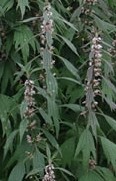 Also called lion’s tail, lion’s ea and cowthwort, this perennial weed is a member of the mint family and is native to Eurasia. It has spread to North American and is now common in much of the US and southern Canada where it can be found in disturbed areas such as roadsides and abandon fields as well as woodlands and garden beds. Motherwort likes partial shade and fertile, moist, well-drained soil but rarely invades lawns because it cannot tolerate mowing. It has a long history of use as both a medicinal and culinary herb in North America and abroad.
Also called lion’s tail, lion’s ea and cowthwort, this perennial weed is a member of the mint family and is native to Eurasia. It has spread to North American and is now common in much of the US and southern Canada where it can be found in disturbed areas such as roadsides and abandon fields as well as woodlands and garden beds. Motherwort likes partial shade and fertile, moist, well-drained soil but rarely invades lawns because it cannot tolerate mowing. It has a long history of use as both a medicinal and culinary herb in North America and abroad.
Description
 One to several square, hairy, upright stems two to five feet tall emerge from a crown and grow two to five feet tall. The palmately lobed leaves are carried on long petioles and are up to four inches long. They are slightly hairy on the upper surface, have toothed margins and a distinct odor when crushed. The pink to purple flowers are less than ½ inch long and are borne in clusters of six to fifteen in the axils of the upper leaves from mid- to late summer. Each flower produces four one-seeded nutlets with hairs that facilitate seed dispersal. As the seeds develop the calyx dries and develops spines. Plants spread by seeds and rhizomes. The generic name Leonurus (Latin Leo for lion) refers to the resemblance of the leaves to a lion’s tail (and perhaps ear) while the specific name, cardiaca, refers to the use of the plant for heart problems.
One to several square, hairy, upright stems two to five feet tall emerge from a crown and grow two to five feet tall. The palmately lobed leaves are carried on long petioles and are up to four inches long. They are slightly hairy on the upper surface, have toothed margins and a distinct odor when crushed. The pink to purple flowers are less than ½ inch long and are borne in clusters of six to fifteen in the axils of the upper leaves from mid- to late summer. Each flower produces four one-seeded nutlets with hairs that facilitate seed dispersal. As the seeds develop the calyx dries and develops spines. Plants spread by seeds and rhizomes. The generic name Leonurus (Latin Leo for lion) refers to the resemblance of the leaves to a lion’s tail (and perhaps ear) while the specific name, cardiaca, refers to the use of the plant for heart problems.
Control
Motherwort is difficult to control. Small populations can be hand pulled using gloves to protect against the spiny calyxes but because the root system is dense, digging the plants out may be necessary. Cutting the plants to the ground repeatedly weakens and kills them over time but must be done before seed set to be effective. Reducing the soil moisture or shade also may weaken and eventually kill the plants. Multiple applications of selective herbicides, such as a combination of 2,4-D and dicamba, or nonselective herbicides, such as glyphosate, may be necessary to eradicate this weed.